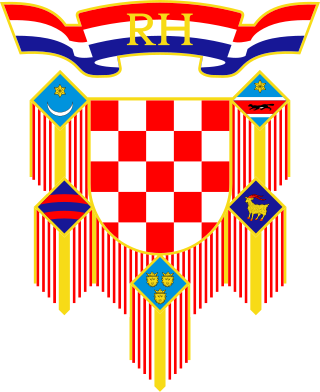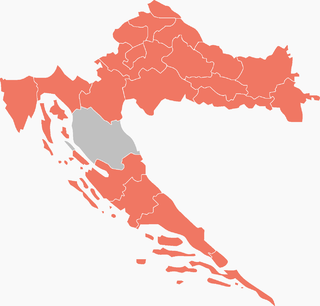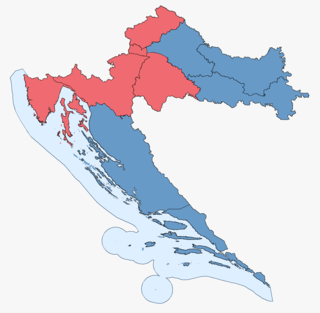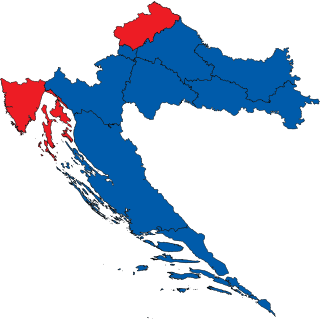 |
|---|
Since its founding in 1990, elections within the Social Democratic Party of Croatia were held numerous times.
 |
|---|
Since its founding in 1990, elections within the Social Democratic Party of Croatia were held numerous times.
The Social Democratic Party of Croatia 2007 leadership election following the death of longtime leader Ivica Račan was held on 2 June 2007. Deputy leader Željka Antunović served as the acting leader and ran for a full term. Little known party spokesperson Zoran Milanović ran as an outsider and reformist promising much needed modernization of the party. Other candidates included Zagreb mayor Milan Bandić and former Foreign Affairs Minister Tonino Picula. Milanović pulled out an unexpected win in the first ballot, but failed to achieve an outright majority. He defeated Antunović in the second ballot and became the leader of the party.
| Candidates | First round | Runoff | ||||
|---|---|---|---|---|---|---|
| Candidate | Votes | % | Votes | % | ||
| Zoran Milanović | 592 | 38.6 | 828 | 55.1 | ||
| Željka Antunović | 381 | 24.8 | 675 | 44.9 | ||
| Milan Bandić | 313 | 20.4 | ||||
| Tonino Picula | 248 | 16.2 | ||||
| Delegate votes: | 1,534 | 100 | 1,503 | 100 | ||
| Source: First round, Second round | ||||||
The Social Democratic Party of Croatia 2008 leadership election to elect the leader of the party was held on 11 May 2008. The incumbent leader Zoran Milanović had first been elected only a year earlier, but lost a close race in the 2007 general election. Davorko Vidović and Dragan Kovačević hoped to unseat the incumbent. Milanović was easily reelected in the first ballot with almost 80 percent of the delegate vote.
| Candidate | Votes | % | |
|---|---|---|---|
| Zoran Milanović | 1,389 | 78.9 | |
| Davorko Vidović | 208 | 11.8 | |
| Dragan Kovačević | 164 | 9.3 | |
| Delegate votes: | 1,761 | 100 | |
| Source: Official result | |||
The Social Democratic Party of Croatia 2012 leadership election to elect the leader of the party was held on 12 May 2012. The incumbent leader and Prime Minister Zoran Milanović ran for his third term since first being elected in 2007 and was unopposed following the party's landslide victory in the 2011 general election. A total of 38,887 party members were eligible to vote of which an estimated 61% turned out. Zoran Milanović was easily reelected receiving 23,554 votes. 179 votes were invalid. This was the first leadership election in any party in Croatia that was held with all party members being eligible to vote. [1]
The Social Democratic Party of Croatia 2016 leadership election to elect the leader of the party were held on 2 April 2016. All party members were eligible to vote. Zoran Milanović remained the President of the SDP with 62% of the vote. [2]
Zoran Milanović the incumbent leader and former Prime Minister ran for his fourth term since first being elected in 2007 and was opposed by Zlatko Komadina the prefect of Primorje-Gorski Kotar County. [3]
According to the Statute of the SDP, the candidates had to collect 1,000 signatures of support of members of the party for the candidacy to be valid. Komadina collected about 5,200 signatures and Milanović collected about 11,000 signatures. [4] The third candidate Dusko Polovina failed to collect the required 1,000 signatures of support.
| Candidate | ||||
|---|---|---|---|---|
| Votes | % | |||
| Zoran Milanović | 12,429 | 60,16% | ||
| Zlatko Komadina | 8,231 | 39,84% | ||
| Total votes: | 20,689 | Turnout: | 55,05% | |
| Candidates | First round | Runoff | ||||
|---|---|---|---|---|---|---|
| Candidate | Votes | % | Votes | % | ||
| Davor Bernardić | 8,409 | 45.82 | 11,412 | 64.54 | ||
| Ranko Ostojić | 4,260 | 23.21 | 6,270 | 35.46 | ||
| Orsat Miljenić | 3,160 | 17.22 | ||||
| Tonino Picula | 2,088 | 11.38 | ||||
| Karolina Leaković | 223 | 1.22 | ||||
| Gordana Sobol | 172 | 0.94 | ||||
| Vesna Škulić | 41 | 0.22 | ||||
| Votes: | 18,405 | 100 | 17,778 | 100 | ||
| Source: [5] [6] | ||||||
After bad result on 2020 Parliamentary elections and resignation of party leader Davor Bernardić, Social Democratic Party held new leadership election on 26 September 2020. Five candidates were running for the position of party leader, 17 candidates for members of presidency and 103 candidates for main board. [7] Second round was held on 3 October 2020 between Peđa Grbin and Željko Kolar, with Grbin winning and becoming new leader of the party and leader of opposition. [8]
| Candidates | First round | Runoff | ||||
|---|---|---|---|---|---|---|
| Candidate | Votes | % | Votes | % | ||
| Peđa Grbin | 3,573 | 41.23 | 5,143 | 64.34 | ||
| Željko Kolar | 2,212 | 25.53 | 2,788 | 34.88 | ||
| Ranko Ostojić | 1,511 | 17.44 | ||||
| Mirela Ahmetović | 1,286 | 14.84 | ||||
| Marino Percan | 50 | 0.58 | ||||
| Invalid/blank votes: | 34 | 0.39 | 62 | 0.78 | ||
| Votes: | 8,666 | 100.00 | 7,993 | 100.00 | ||
| Registered voters: | 11,585 | 74.80 | 11,585 | 68.99 | ||
| Source: [9] [10] | ||||||

The president of Croatia, officially the President of the Republic of Croatia, is the head of state, commander-in-chief of the military and chief representative of the Republic of Croatia both within the country and abroad. The president is the holder of the highest office in Croatia. However, the president is not the head of the executive branch as Croatia has a parliamentary system in which the holder of the post of prime minister is the most powerful person within the country's constitutional framework and everyday politics.

The Social Democratic Party of Croatia is a social-democratic political party in Croatia. The SDP is anti-fascist, progressive, and strongly pro-European. The SDP was formed in 1990 as the successor of the League of Communists of Croatia, Croatian branch of the League of Communists of Yugoslavia, which had governed Croatia within the Yugoslav federation since World War II.
Regular elections in Croatia are mandated by the Constitution and legislation enacted by Parliament. The presidency, Parliament, county prefects and assemblies, city and town mayors, and city and municipal councils are all elective offices. Since 1990, seven presidential elections have been held. During the same period, ten parliamentary elections were also held. In addition, there were nine nationwide local elections. Croatia has also held three elections to elect members of the European Parliament following its accession to the EU on 1 July 2013.

Parliamentary elections were held in Croatia on 25 November 2007 and for overseas voters on 24 and 25 November. The campaign officially started on 3 November. The President of Croatia announced elections on 17 October and 14 days were allowed for candidate lists to be submitted.

Željka Antunović is a Croatian former politician who served as acting president of the Social Democratic Party between April and June 2007, and as Minister of Defence from 2002 until 2003 in the second cabinet of Ivica Račan. She was the first and to date only female holder of the office.

Zoran Milanović is a Croatian politician serving as President of Croatia since 19 February 2020. Prior to assuming the presidency, he was prime minister from 2011 to 2016 and president of the Social Democratic Party from 2007 to 2016.

Ljubo Jurčić is a Croatian economist, current president of the Croatian Association of Economists since 2006 and former Minister of Economy from 2002 to 2003.

Presidential elections were held in Croatia on 27 December 2009 and 10 January 2010. Twelve candidates participated in the first round, prior to a run-off between first-round winner Ivo Josipović and runner-up Milan Bandić. In the run-off, Josipović won a landslide victory, receiving 60.3% of the vote becoming the first elected president nominated by the Social Democratic Party of Croatia (SDP). The incumbent president Stjepan Mesić, who was first elected in 2000 as the candidate of the Croatian People's Party and re-elected in 2005 as an independent, was ineligible to seek re-election to a third term due to term limits.

Ivo Josipović is a Croatian academic, jurist, and politician who served as President of Croatia from 2010 to 2015.

Parliamentary elections were held in Croatia on Sunday, 4 December 2011 to elect 151 members to the Croatian Parliament. They were the sixth parliamentary election in Croatia since independence.
In Croatia, the Opposition comprises all political parties represented in the Croatian Parliament that are not part of the Government which is supported by the parliamentary majority.

The Restart Coalition is a centre-left political alliance in Croatia. The coalition was formed in 2010 as the Kukuriku Coalition. This somewhat facetious name meaning 'cock-a-doodle-doo', taken from a restaurant of the same name in Kastav where the coalition leaders first convened in July 2009, became well known and was eventually taken as the coalition's official name. The coalition originally consisted of four centrist and centre-left parties in the Croatian Parliament: the Social Democratic Party of Croatia (SDP), Croatian People's Party – Liberal Democrats (HNS-LD), Croatian Party of Pensioners (HSU) and Istrian Democratic Assembly (IDS). The coalition won an absolute majority of seats in the 2011 parliamentary election and successfully formed a government led by Zoran Milanović (SDP).

Parliamentary elections were held in Croatia on 8 November 2015. All 151 seats in the Parliament were up for election. This parliamentary election was the 8th since the first multi-party election in 1990 and the first since Croatia joined the European Union in 2013. The ruling center-left Croatia is Growing coalition, led by Prime Minister Zoran Milanović, was challenged by the center-right Patriotic Coalition led by the HDZ and headed by its party chairman Tomislav Karamarko, and also faced several new political coalitions.

Presidential elections were held in Croatia on 28 December 2014 and 11 January 2015, the sixth such elections since independence in 1991. Only four candidates contested the elections, the lowest number since 1997. Incumbent President Ivo Josipović, who had been elected as the candidate of the Social Democratic Party in 2009–2010 but ran as an independent, was eligible to seek reelection for a second and final five-year term. As no candidate received 50% of the vote in the first round in December 2014, a run-off took place in January 2015 between the two candidates with the most votes; Josipović and Kolinda Grabar-Kitarović. Grabar-Kitarović went on to win the elections by a slim margin of 32,509 votes or 1.48%, making her Croatia's first female president.

Presidential elections were held in Croatia on 22 December 2019. Social Democratic Party nominee Zoran Milanović narrowly defeated incumbent president Kolinda Grabar-Kitarović in a second round of voting.

Parliamentary elections were held in Croatia on 5 July 2020. They were the tenth parliamentary elections since the first multi-party elections in 1990 and elected the 151 members of the Croatian Parliament. 140 Members of Parliament were elected from geographical electoral districts in Croatia, three MPs were chosen by the Croatian diaspora and eight MPs came from the ranks of citizens registered as belonging to any of the 22 constitutionally recognized national minorities.

Peđa Grbin is a Croatian lawyer and politician serving as President of the Social Democratic Party since 2020. He was also Leader of the Opposition from 2020 until 2022, when he was replaced by Davorko Vidović, the leader of the newly-established Social Democrats. He has represented VIII electoral district in the Croatian Parliament since 2011.

Parliamentary elections were held in Croatia on 11 September 2016, with all 151 seats in the Croatian Parliament up for election. The elections were preceded by a successful motion of no confidence against Prime Minister Tihomir Orešković and his cabinet on 16 June 2016, with 125 MPs voting in favour of the proposal. A subsequent attempt by the Patriotic Coalition to form a new parliamentary majority, with Minister of Finance Zdravko Marić as Prime Minister, failed and the Parliament voted to dissolve itself on 20 June 2016. The dissolution took effect on 15 July 2016, which made it possible for President Kolinda Grabar-Kitarović to officially call for elections on 11 September 2016. These were the ninth parliamentary elections since the 1990 multi-party elections.

Silvano Hrelja is a Croatian politician who has been Leader of the Croatian Party of Pensioners (HSU) since 2008 and a member of the Croatian Parliament for the VIII electoral district since 2003 having been elected in the 2003, 2007, 2011 and 2015 parliamentary elections.

Presidential elections were held in Montenegro on 15 April 2018. Former Prime Minister Milo Đukanović, leader of the ruling DPS was elected as new President of Montenegro in the first round.